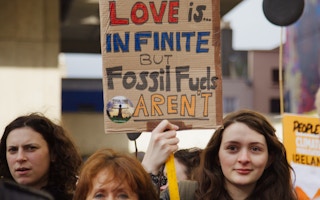The most important number in the world of climate action is ZERO: that is how many new fossil fuel projects world leaders can approve and still keep the promises they made under the Paris Climate Agreement, which comes into force today.
The encouraging news is that the Agreement was ratified faster than almost any other treaty ever, proving that the political momentum for climate action continues. Renewable energies continue their irresistible rise, and so far over 600 institutions have divested from coal, gas and oil companies.
However, the treaty falls seriously short from embodying the climate action the world needs to lessen the climate crisis. The fossil fuel industry’s recklessness continues to push the planet to the brink of catastrophe. A recent study from Oil Change International shows that the coal, oil and gas currently under exploitation will push the planet past the point of climate safety. Their potential carbon emissions will take us beyond 2°C of warming.
In essence, the report scientifically proves what we have been saying all year – that we need to keep all fossil fuels in the ground.
It is not just this report that is finding government climate action lacking. The UNFCCC Secretariat found, in its recent assessment of the Intended Nationally Determined Contributions (INDCs) submitted by global governments, that they provide only about one-fourth of the carbon mitigation needed to keep to a 2°C pathway, and that the 1.5°C goal would be surpassed by 2020.
Green-lighting any new fossil fuel project poses a real danger to the lives of millions worldwide, and makes the treaty void of any relevance. So it is simple - governments can either meet their international commitments with serious NDCs or allow the prospecting and development of new fossil fuel. They cannot do both. Every exploratory drilling operation, every new permit for a new field or mine is an incredibly irresponsible act which contradicts the Agreement they made.
The only option left is to stop building new fossil fuel projects, phase out existing projects to ensure a just transition, and fully invest in renewable energy accessible for all. Both pre- and post-2020 ambitions must be sharply increased. Investors and governments have a responsibility to both divest from climate destruction and accelerate the just transition to a 100 per cent renewable energy economy.
Countries in the Global North need to lead the shift towards low-carbon, energy-efficient economies while at the same time intensifying cooperation with the Global South by sharing technology, and support adaptation efforts as countries need to leapfrog into low-carbon inclusive energy pathways. True sustainable development is only possible by opting for economies built on renewable energy systems.
To make sure this happens, we - the people - will continue to hold governments accountable. More importantly, we will continue building a people’s climate movement to reclaim power over our future.
“
The INDCs submitted by global governments…provide only about one-fourth of the carbon mitigation needed to keep to a 2°C pathway
Great victories have already been won thanks to leadership from frontline communities: President Obama rejected the Presidential Permit for the Keystone XL tar sands pipeline, more recently Turkey cancelled a coal project, and UNESCO just recommended cancelling a coal project near a heritage site in Bangladesh.
As a movement, we have honoured our promise throughout 2016. We know it is essential to keep on honouring it in the future. With that in mind as the next climate talks in Marrakech are being framed as the “Action COP,” action is exactly what we will demand. We are going to maintain pressure to make sure real climate action happens.
Our demand to world leaders meeting in Marrakech is this: stop new fossil fuel projects from being built. Redirect finance for a just transition to 100 per cent renewable energy that can empower people across the globe. If you agree that must be our priority, join us in our call.
Hoda Baraka is Global Communications Manager at 350.org. This story is published with permission from Thomson Reuters Foundation, the charitable arm of Thomson Reuters, that covers humanitarian news, women’s rights, trafficking, corruption and climate change. Visit http://news.trust.org











